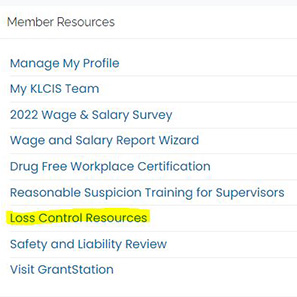City Sidewalk Safety
Sidewalk maintenance and repairs can be expensive, and so can accident claims related to damaged sidewalks.
Sidewalks are an important legal liability exposure for Kentucky cities. This exposure affects cities of all sizes. Even small cities have hundreds of feet of sidewalks, and larger cities may have miles of them. Over the past three years, Kentucky League of Cities Insurance Services has received 113 sidewalk liability claims costing more than $1.5 million. “A well-maintained network of sidewalks provides a higher level of safety for pedestrian traffic,” KLC Director of Loss Control Greg Partin said. “A documented inspection, repair, and maintenance program significantly reduces the probability of injuries and legal liability claims.”
Cities are responsible for keeping sidewalks in a reasonably safe condition and may be responsible for incidents resulting in damage claims if they are not properly maintained. A city is not required to maintain perfect sidewalks, but a person can have the right to recover damages from a city for injuries caused by defective or dangerous sidewalks from the common law of negligence. The Kentucky Attorney General’s Office released the following opinion, OAG 83-431, related to sidewalk repair. "A city has the authority to repair and maintain public sidewalks, the same as it would public streets...[A] city may require abutting property owners to keep the sidewalks in repair...The general rule concerning the duty to construct and maintain sidewalks is that no such duty rests upon the owner of the abutting premises in the absence of a statute or ordinance imposing such duty upon them...Thus, while the city has the authority to require by ordinance property owners to repair or pay for the repair of the abutting sidewalks, in the absence of such an ordinance, the obligation rests with the city to repair sidewalks abutting city streets."
A person must establish certain facts to recover damages, including:
• While using the sidewalk properly and with reasonable care, they suffered injury by a defect.
• The sidewalk was not reasonably safe because of the condition.
• The city knew or should have known of the condition and failed to take reasonable steps to eliminate it.
Many cities have adopted ordinances as part of their sidewalk safety policy, and we strongly encourage every city to develop and implement its own program. Steps include:
• Establish a policy that includes the conditions that warrant repair or replacement.
• Institute a formal inspection program to identify and document problem areas.
• Develop a system for prioritizing repair and replacement needs based on the annual inspection results.
• Establish a repair or replacement procedure that states whether the abutting property owner or the city will repair sidewalks or if both will share the responsibility.
The city may offer several options to remedy the costs associated with repairs and replacements. Municipalities must exercise care in crafting these programs to meet public purpose expenditure requirements. The KLC Municipal Law Department is happy to help if you have questions in this area.
For more information or assistance in developing a sidewalk safety program for your city, contact the Kentucky League of Cities Insurance Service Loss Control or

Municipal Law departments at 1-800-876-4552.
To access the KLC Step-by-Step Guide to Sidewalk Safety, log into your KLC account and go to the Insurance Dashboard. Click on "Loss Control Resources" in the Member Resources box in the bottom right of your screen.



